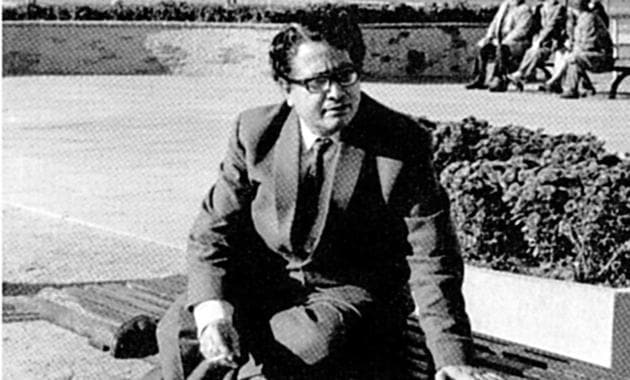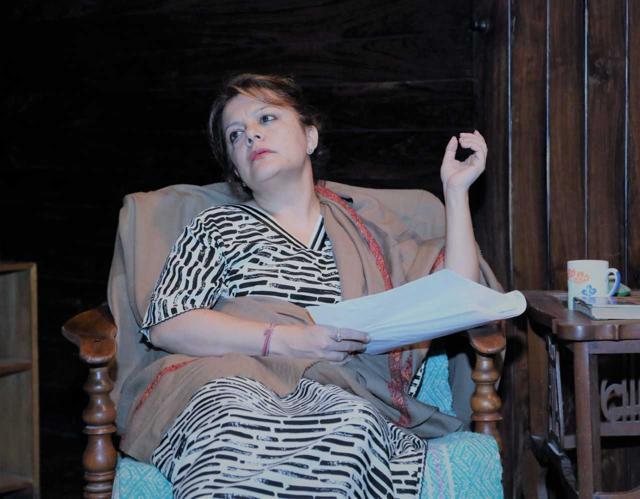Mohan and Anita Rakesh’s difficult love story
Rakesh was part of the celebrated trio of writers who change the course of the Hindi short story
I first met Anita Rakesh, the widow of the great Hindi writer Mohan Rakesh, more than two years ago. I spent the evening drinking coffee and listening to her, fascinated, as she spoke about Rakesh. As I was leaving, she gave me a 164-page page book to read – Satrein Aur Satrein (Stray Thoughts)

It is the story of her life, written by her, first serialised in the Hindi magazine Sarika, and subsequently published as a book in 2002. I finished it in two sittings – it is a powerful, engrossing account of her life, from the time she came to Delhi with her family, one of thousands of Partition refugees, to her tumultuous years with Rakesh, his early death (he was just 46) and her painful struggle to rebuild her world.

In his short life, Rakesh wrote memorable plays (Aadhe Adhure, Aashadh Ka Ek Din, Lehron Ke Rajhans) and novels (the best is undoubtedly the dark and compelling Andhere Band Kamre, set in Delhi in the early Fifties) along with dozens of highly acclaimed short stories. Indeed, he was part of the celebrated trio of writers – along with Rajendra Yadav and Kamleshwar – who influenced the direction and course of the Hindi short story
This weekend, at the Habitat Centre, as part of a series of literary evenings called Nashist, presented by Impresario Asia, there will be a dramatised reading from Satrein Aur Satrein by actor Kanika Aurora. “I was very moved when I read the book,” says Kanika, who grew up in Hong Kong, worked in a corporate job, but kept alive a keen interest in Hindi literature instilled in her by her family. “It was an unexpected treat. Today’s generation is oblivious to these great Hindi writers. For me, it’s sheer blasphemy if you haven’t heard of someone like Mohan Rakesh!” Nashist aims to set this right by introducing audiences to towering figures in Hindustani literature – after this evening dedicated to Anita and Mohan Rakesh, Kanika will take up Amrita Pritam and Imroz’s story for a future performance. But for this weekend’s performance, apart from Satrein Aur Satrein, Kanika will also read from Rakesh’s diary.
Both the books paint a vivid picture of Anita and Rakesh’s intense, passionate love story. He was the twice-married brilliant young literary star searching for love. He often told Anita, “I want a home, I have got everything in my life, except a home…” Anita was not yet 21 when she ran away with the 38-year-old Rakesh. It wasn’t easy for an inexperienced young girl her to understand a complex man like him.
But she had already showed her mettle in her gritty resolve to love Rakesh despite fierce family opposition. She grew up in a dysfunctional family where she – and her brother – were often the victims of parental violence. Her mother, who was obsessed with Hindi writers and followed their careers avidly, decided to cultivate Rakesh. She began corresponding with him and eventually succeeded in getting him to visit her when the family temporarily moved to Gwalior from Delhi.
It was during these visits that something sparked between Anita and Rakesh. It got to the point when Rakesh said her he loved her and Anita felt she had to tell her mother that she wanted to marry Rakesh. The response was savage. “He won’t even spit on you and you want to marry him!” bit out her mother.
Anita was physically assaulted by her parents – something that continued to happen even when the family moved back to Delhi. But two people in love will find a way to meet each other – every morning Rakesh would travel from his home in Karol Bagh to Chawri Bazaar, where Anita was studying in a college, to spend some time with her. Eventually, a series of events culminated in her running away with Rakesh to Bombay. And that is when their life together really began, only to be cut short nine years later by Rakesh’s untimely death.

This year, Anita has followed up Satrein Aur Satrein with Antim Satrein, which once again gives readers glimpses of her life with Rakesh. Despite their love for each other, the marriage was turbulent. Perhaps it was the age gap; perhaps it was an emotional and intellectual gap. Rakesh was single-mindedly focused on his writing. In Antim Satrein, Anita writes about how, when he was working on a book, he would shut the door to his room and literally shut her out of his life. He would finish his book, but the banishment would take an emotional toll on Anita. She would then find solace with Rakesh’s mother, whose loving care would sustain her in those lonely weeks.
When he was not working, Rakesh loved nothing more than to spend long convivial evenings with his group of friends – writers, theatre directors, poets, filmmakers. Hindi poet and critic Ashok Vajpeyi, who was a young man barely out of his teens when Rakesh was at the zenith of his popularity, remembers him as “a warm, boisterous Punjabi who enjoyed life and had an uproarious laugh.” But where did that leave Anita? “She was so young, and she wanted his attention,” says Kanika. “And he wasn’t always able to give her that attention. Mere paas time nahin hai, he would tell her.”
Despite his impatience, when Anita was not with him, he would miss her, as would she. On one occasion, Anita decided to go to Shimla and get a B. Ed. Degree. But in no time, she abandoned the idea and came back to Delhi, unable to stay away from her husband and her home for so long. Even their fighting was a kind of love. Anita remembers asking Rakesh one day, “Why is it like this Rakesh? Amma [his mother] says that when you fight, the love only increases.”
And that is how the love story of Anita and Rakesh unfolded. You can see flashes of it in the weekend performance; you could also read the books and see it in its entirety.





